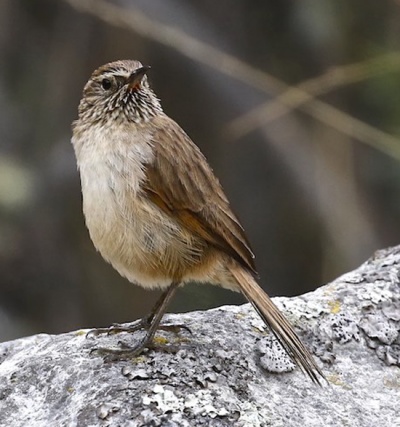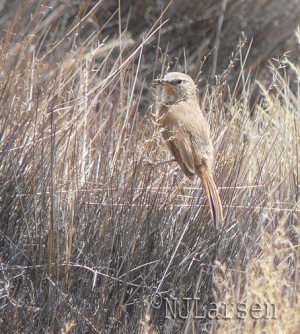m (→References: Typo) |
m (→External Links: removed BFTV link) |
||
| (2 intermediate revisions by 2 users not shown) | |||
| Line 1: | Line 1: | ||
| − | [[Image: | + | [[Image:CordilleranCanasteroSJ.jpg|thumb|400px|right|Photo by {{user|Stanley+Jones|Stanley Jones}} <br />Ancash, Lima, [[Peru]], August, 2017]] |
;[[:Category:Asthenes|Asthenes]] modesta | ;[[:Category:Asthenes|Asthenes]] modesta | ||
==Identification== | ==Identification== | ||
| + | [[Image:Cordilleran-Canastero-2-P10.jpg|thumb|300px|right|Showing orange throat patch<br />Photo by {{user|njlarsen|njlarsen}}<br />Lauca NP, [[Chile]], November 2009]] | ||
| + | 15–16 cm (6-6¼ in) | ||
*Brown upperparts | *Brown upperparts | ||
*Grey head | *Grey head | ||
*Pale underparts | *Pale underparts | ||
| + | *Orange throat patch | ||
*Dull streaked breast | *Dull streaked breast | ||
*Brown tail, rufous edging | *Brown tail, rufous edging | ||
| − | *White supercilium | + | *White [[Topography#Heads|supercilium]] |
====Similar Species==== | ====Similar Species==== | ||
[[Canyon Canastero]] has a longer tail and is more evenly rufous on upperpart including upper tail. They overlap in part but Cordilleran Canastero continues further up in elevation than Canyon. | [[Canyon Canastero]] has a longer tail and is more evenly rufous on upperpart including upper tail. They overlap in part but Cordilleran Canastero continues further up in elevation than Canyon. | ||
| Line 28: | Line 31: | ||
Three further subspecies (''cordobae, hilereti'' and ''navasi'') are no longer generally recognised<sup>[[#References|[2]]]</sup> | Three further subspecies (''cordobae, hilereti'' and ''navasi'') are no longer generally recognised<sup>[[#References|[2]]]</sup> | ||
==Habitat== | ==Habitat== | ||
| − | + | Puna, temperate and semi-humid grasslands and rocky scrub. | |
==Behaviour== | ==Behaviour== | ||
| − | + | They run on the ground with tail held upwards. | |
| + | ====Diet==== | ||
| + | Their main diet consists of insects such as ants and cockroaches. | ||
==References== | ==References== | ||
| − | #{{Ref- | + | #{{Ref-Clements6thAug17}}#Avibase |
#http://birdforum.net/showthread.php?t=159193 Birdforum thread] discussing id of this species | #http://birdforum.net/showthread.php?t=159193 Birdforum thread] discussing id of this species | ||
# Alvaro Jaramillo. 2003. Birds of Chile. Princeton Field Guides. ISBN 0-691-11740-3 | # Alvaro Jaramillo. 2003. Birds of Chile. Princeton Field Guides. ISBN 0-691-11740-3 | ||
| + | #Handbook of the Birds of the World Alive (retrieved Dec 2017) | ||
#Wikipedia | #Wikipedia | ||
#Arthur Grosset | #Arthur Grosset | ||
| Line 40: | Line 46: | ||
==External Links== | ==External Links== | ||
| − | {{GSearch|Asthenes | + | {{GSearch|"Asthenes modesta" {{!}} "Cordilleran Canastero" {{!}} "Canastero Chico"}} |
| + | {{GS-checked}}1 | ||
| + | <br /> | ||
<br /> | <br /> | ||
| − | |||
| − | |||
| − | [[Category:Birds]] [[Category:Asthenes | + | [[Category:Birds]] [[Category:Asthenes]] |
Latest revision as of 18:36, 17 June 2023
- Asthenes modesta
Identification
15–16 cm (6-6¼ in)
- Brown upperparts
- Grey head
- Pale underparts
- Orange throat patch
- Dull streaked breast
- Brown tail, rufous edging
- White supercilium
Similar Species
Canyon Canastero has a longer tail and is more evenly rufous on upperpart including upper tail. They overlap in part but Cordilleran Canastero continues further up in elevation than Canyon.
Distribution
South America: found in Peru, Bolivia, Chile and Argentina.
Taxonomy
Subspecies
Five subspecies are recognized[1]:
- A.m. proxima:
- Central and south-eastern Peru (Junín and Cuzco)
- A.m. modesta:
- A.m. rostrata:
- Andes of northern Bolivia (Cochabamba)
- A.m. serrana:
- Central Argentina (south to Santa Cruz)
- A.m. australis:
- Andes of Chile (Atacama to Colchagua) and adjacent Argentina
Three further subspecies (cordobae, hilereti and navasi) are no longer generally recognised[2]
Habitat
Puna, temperate and semi-humid grasslands and rocky scrub.
Behaviour
They run on the ground with tail held upwards.
Diet
Their main diet consists of insects such as ants and cockroaches.
References
- Clements, J. F., T. S. Schulenberg, M. J. Iliff, D. Roberson, T. A. Fredericks, B. L. Sullivan, and C. L. Wood. 2017. The eBird/Clements checklist of birds of the world: v2017, with updates to August 2017. Downloaded from http://www.birds.cornell.edu/clementschecklist/download/
- Avibase
- http://birdforum.net/showthread.php?t=159193 Birdforum thread] discussing id of this species
- Alvaro Jaramillo. 2003. Birds of Chile. Princeton Field Guides. ISBN 0-691-11740-3
- Handbook of the Birds of the World Alive (retrieved Dec 2017)
- Wikipedia
- Arthur Grosset
Recommended Citation
- BirdForum Opus contributors. (2024) Cordilleran Canastero. In: BirdForum, the forum for wild birds and birding. Retrieved 12 May 2024 from https://www.birdforum.net/opus/Cordilleran_Canastero
External Links
GSearch checked for 2020 platform.1





